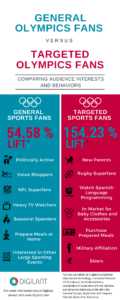What the Rio Olympics Can Teach US Marketers About Targeting Sports Fans
by Lindsay Rowntree on 30th Aug 2016 in News

Today (30 August), Digilant released some new online behaviour analysis on US sports fans of the Rio Olympics. The research shows that not all Olympics sports fans are created equal. For any marketer looking for targeting success, and maximum engagement during a major sporting event, it's not enough to assume that some high-quality creative related to sports will alone achieve the intended objective. Digilant's data analysis shows the attitudes and behaviours of online consumers can influence their sporting interests and the ability to leverage this data can put any marketer one step ahead of the competition.
Consumer Persona, Digilant's proprietary data science solution, powered the study, which reveals the key differences between general and target sport audiences. What do we mean by 'general' and 'target' sport audiences? According to Digilant, the difference is significant and can mean a vast difference in user interests and behaviours. 'General' refers to mainstream sports – the crowd-pleasers such as swimming, track & field, and gymnastics. 'Targeted' refers to the lesser known and potentially less popular (in the US, at least) sports, such as rugby sevens.
The study showed that consumers who are rugby fans and skiers are 154.23% more likely to be fans of targeted, less mainstream Olympic sports. But what relevance does this information have for marketers? Well, it potentially demonstrates a missed opportunity. Understanding the interests of your audience and leveraging advanced programmatic targeting technology allows you to better reach it.
 Consumer Persona examined the online audience behaviour of US Olympics sports fans to help brands, agencies, and marketers to better understand how it important it is to use programmatic targeting technology. IT revealed the US Olympic sports fan audience is comprised of at least two key segments, with vastly different interests, attitudes, and behaviours: general versus targeted.
Consumer Persona examined the online audience behaviour of US Olympics sports fans to help brands, agencies, and marketers to better understand how it important it is to use programmatic targeting technology. IT revealed the US Olympic sports fan audience is comprised of at least two key segments, with vastly different interests, attitudes, and behaviours: general versus targeted.
NBC, the official US broadcaster for the 2016 Rio Olympics, drew in an average total primetime viewing figure of 27.5 million across broadcast, cable and online during the games, so the attention across the country this summer was huge, with more people than ever experiencing the sporting extravaganza online. According to NBC, 100 million unique users accessed the digital coverage for the Olympic Games, which is a 29% increase from London 2012. Naturally, marketers have been trying to target US Olympic sports fans as consumers. But according to Digilant’s new data analysis, marketers probably don’t really know this audience because they target them as one group; and knowing the differences between these segments should be meaningful to marketers.
“This is a classic marketing mistake”, said Patrick Robson, country manager, Digilant UK. “Marketers try to use programmatic to target a distinct group of consumers – such as US Olympics fans – but they do it with a broad-brush stroke, and treat the target audience as one big group. In other words, they fail to factor in differences in behaviours, interests, and attitudes that can create important segments within an audience. Our advanced targeting technology enables marketers to drill-down into their core target audience and uncover new key segments, so they can better understand who they really are.”
The 'general' Olympics sports fan segment, interested in the mainstream sports, tends to be a politically active value shopper, who likes to cook at home. While the 'targeted' Olympic sports fan audience segment, with its affinity for the less mainstream sports, are typically new parents with a military affiliation who like to buy prepared meals.
For a marketer, this type of information should be invaluable in ensuring efficient investment in a target audience. It's compelling analysis. For example, for any brand looking to target new parents and have the knowledge this market segment is 154% more likely to display interest in niche sports over mainstream sports, you can be more targeted, more engaging and more efficient.
As Robson confirmed, marketers are leaving money on the table as a direct result of using outdated programmatic technology. Brands can drive performance, extend reach and boost efficiencies is they can drill down into audiences with tremendous granularity, uncover key segments and dynamically target them in real-time.








Follow ExchangeWire